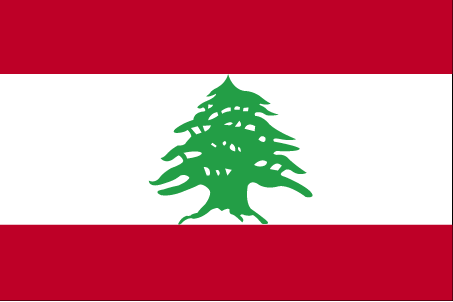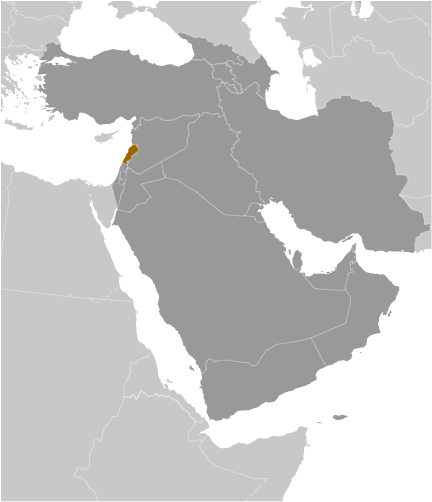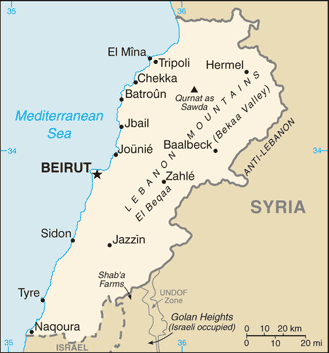Following World War I, France acquired a mandate over the northern portion of the former Ottoman Empire province of Syria. The French separated out the region of Lebanon in 1920, and granted this area independence in 1943. A lengthy civil war (1975-1990) devastated the country, but Lebanon has since made progress toward rebuilding its political institutions. Under the Ta'if Accord - the blueprint for national reconciliation - the Lebanese established a more equitable political system, particularly by giving Muslims a greater voice in the political process while institutionalizing sectarian divisions in the government. Since the end of the war, Lebanon has conducted several successful elections. Most militias have been reduced or disbanded, with the exception of Hizballah, designated by the US State Department as a Foreign Terrorist Organization, and Palestinian militant groups. During Lebanon's civil war, the Arab League legitimized in the Ta'if Accord Syria's troop deployment, numbering about 16,000 based mainly east of Beirut and in the Bekaa Valley. Israel's withdrawal from southern Lebanon in May 2000 and the passage in September 2004 of UNSCR 1559 - a resolution calling for Syria to withdraw from Lebanon and end its interference in Lebanese affairs - encouraged some Lebanese groups to demand that Syria withdraw its forces as well. The assassination of former Prime Minister Rafiq HARIRI and 22 others in February 2005 led to massive demonstrations in Beirut against the Syrian presence ("the Cedar Revolution"), and Syria withdrew the remainder of its military forces in April 2005. In May-June 2005, Lebanon held its first legislative elections since the end of the civil war free of foreign interference, handing a majority to the bloc led by Sa'ad HARIRI, the slain prime minister's son. In July 2006, Hizballah kidnapped two Israeli soldiers leading to a 34-day conflict with Israel in which approximately 1,200 Lebanese civilians were killed. UNSCR 1701 ended the war in August 2006, and Lebanese Armed Forces (LAF) deployed throughout the country for the first time in decades, charged with securing Lebanon's borders against weapons smuggling and maintaining a weapons-free zone in south Lebanon with the help of the UN Interim Force in Lebanon (UNIFIL). The LAF in May-September 2007 battled Sunni extremist group Fatah al-Islam in the Nahr al-Barid Palestinian refugee camp, winning a decisive victory, but destroying the camp and displacing 30,000 Palestinian residents. Lebanese politicians in November 2007 were unable to agree on a successor to Emile LAHUD when he stepped down as president, creating a political vacuum until the election of LAF Commander Gen. Michel SULAYMAN in May 2008 and the formation of a new unity government in July 2008. Legislative elections in June 2009 again produced victory for the bloc led by Sa'ad HARIRI, but a period of prolonged negotiation over the composition of the cabinet ensued. A national unity government was finally formed in November 2009 and approved by the National Assembly the following month. In January 2010, Lebanon assumed a nonpermanent seat on the UN Security Council for the 2010-11 term.
Population
4,125,247 (July 2010 est.)
Country comparison to the world: 127
Nationality
Noun:Lebanese (singular and plural)
Adjective:Lebanese
Ethnic groups
Arab 95%, Armenian 4%, other 1%
note: many Christian Lebanese do not identify themselves as Arab but rather as descendents of the ancient Canaanites and prefer to be called Phoenicians
Religions
Muslim 59.7% (Shia, Sunni, Druze, Isma'ilite, Alawite or Nusayri), Christian 39% (Maronite Catholic, Greek Orthodox, Melkite Catholic, Armenian Orthodox, Syrian Catholic, Armenian Catholic, Syrian Orthodox, Roman Catholic, Chaldean, Assyrian, Copt, Protestant), other 1.3%
note: 17 religious sects recognized
Languages
Arabic (official), French, English, Armenian
Country Name
Conventional long form:Lebanese Republic
Conventional short form:Lebanon
Local long form:Al Jumhuriyah al Lubnaniyah
Local short form:Lubnan
Former:Greater Lebanon
Government Type
republic
Capital
Name:Beirut
Geographic coordinates:33 52 N, 35 30 E
Time difference:UTC+2 (7 hours ahead of Washington, DC during Standard Time)
daylight saving time: +1hr, begins last Sunday in March; ends last Sunday in October
Administrative divisions
6 governorates (mohafazat, singular - mohafazah); Beqaa, Beyrouth (Beirut), Liban-Nord, Liban-Sud, Mont-Liban, Nabatiye
note: two new governorates - Aakar and Baalbek-Hermel - have been legislated but not yet implemented
Independence
22 November 1943 (from League of Nations mandate under French administration)
National Holiday
Independence Day, 22 November (1943)
Constitution
23 May 1926; amended a number of times, most recently in 1990 to include changes necessitated by the Charter of Lebanese National Reconciliation (Ta'if Accord) of October 1989
Legal system
mixture of Ottoman law, canon law, Napoleonic code, and civil law; the constitutional court reviews laws only after they have been passed; has not accepted compulsory ICJ jurisdiction
Suffrage
21 years of age; compulsory for all males; authorized for women at age 21 with elementary education; excludes military personnel
Executive branch
Chief of state:President Michel SULAYMAN (since 25 May 2008)
Head of government:Prime Minister Sa'ad al-Din al-HARIRI (since 9 November 2009); Deputy Prime Minister Elias MURR (since 9 November 2009)
Cabinet:Cabinet chosen by the prime minister in consultation with the president and members of the National Assembly
(For more information visit the World Leaders website)
Elections:president elected by the National Assembly for a six-year term (may not serve consecutive terms); election last held on 25 May 2008 (next to be held in 2014); the prime minister and deputy prime minister appointed by the president in consultation with the National Assembly
Election results:Michel SULAYMAN elected president; National Assembly vote - 118 for, 6 abstentions, 3 invalidated; 1 seat unfilled due to death of incumbent
Legislative branch
unicameral National Assembly or Majlis al-Nuwab (Arabic) or Assemblee Nationale (French) (128 seats; members elected by popular vote on the basis of sectarian proportional representation to serve four-year terms)
Elections:last held on 7 June 2009 (next to be held in 2013)
Election results:percent of vote by group - March 8 Coalition 54.7%, March 14 Coalition 45.3%; seats by group - March 14 Coalition 71; March 8 Coalition 57
Judicial branch
four Courts of Cassation (three courts for civil and commercial cases and one court for criminal cases); Constitutional Council (called for in Ta'if Accord - rules on constitutionality of laws); Supreme Council (hears charges against the president and prime minister as needed)
Political Parties and Leaders
14 March Coalition: Democratic Left [Ilyas ATALLAH]; Democratic Renewal Movement [Nassib LAHUD]; Future Movement Bloc [Sa'ad al-HARIRI]; Kataeb Party [Amine GEMAYEL]; Lebanese Forces [Samir JA'JA]; Tripoli Independent Bloc
8 March Coalition: Development and Resistance Bloc [Nabih BERRI, leader of Amal Movement]; Free Patriotic Movement [Michel AWN]; Loyalty to the Resistance Bloc [Mohammad RA'AD] (includes Hizballah [Hassan NASRALLAH]); Nasserite Popular Movement [Usama SAAD]; Popular Bloc [Elias SKAFF]; Syrian Ba'th Party [Sayez SHUKR]; Syrian Social Nationalist Party [Ali QANSO]; Tashnaq [Hovig MEKHITIRIAN]
Independent: Democratic Gathering Bloc [Walid JUNBLATT, leader of Progressive Socialist Party]; Metn Bloc [Michel MURR]
Political pressure groups and leaders
Maronite Church [Patriarch Nasrallah SFAYR]
other: note - most sects retain militias and a number of militant groups operate in Palestinian refugee camps
International organization participation
ABEDA, ACCT, AFESD, AMF, FAO, G-24, G-77, IAEA, IBRD, ICAO, ICC, ICRM, IDA, IDB, IFAD, IFC, IFRCS, ILO, IMF, IMO, IMSO, Interpol, IOC, IPU, ISO, ITSO, ITU, LAS, MIGA, NAM, OAS (observer), OIC, OIF, OPCW, PCA, UN, UN Security Council (temporary), UNCTAD, UNESCO, UNHCR, UNIDO, UNRWA, UNWTO, UPU, WCO, WFTU, WHO, WIPO, WMO, WTO (observer)
Diplomatic representation in the US
Chief of mission: Ambassador Antoine CHEDID
Chancery:2560 28th Street NW, Washington, DC 20008
Telephone:[1] (202) 939-6300
FAX:[1] (202) 939-6324
Consulate(s) general:Detroit, New York, Los Angeles
Diplomatic representation from the US
Chief of mission:Ambassador Michele J. SISON
Embassy:Awkar, Lebanon (Awkar facing the Municipality)
Mailing address:P. O. Box 70-840, Antelias, Lebanon; from US: US Embassy Beirut, 6070 Beirut Place, Washington, DC 20521-6070
Telephone:[961] (4) 542600, 543600
FAX:[961] (4) 544136
Flag description
three horizontal bands consisting of red (top), white (middle, double width), and red (bottom) with a green cedar tree centered in the white band










